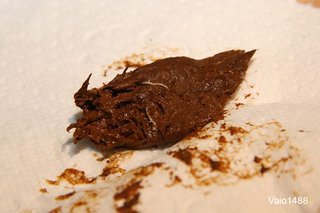Threadworms (pinworms) are tiny worms in your poo. They're common in children and spread easily. You can usually treat them yourself with advice from your pharmacist.
Symptoms of threadworms
You can spot worms in your poo. They look like pieces of white thread and can be up to 1 centimetre long.
See what threadworms look like in poo

You may see them around your child's bottom (anus). The worms usually come out at night while your child is sleeping. You may spot threadworms on bed clothes or sheets.
Threadworms can cause severe itching around the anus or vagina, particularly at night. This can disturb sleep.
Less common signs of worms include:
- wetting the bed
- irritated skin around the anus
- weight loss
Causes of threadworms
You can get threadworms when threadworm eggs are swallowed. They lay eggs around your anus, which make it itchy. The eggs get stuck on your fingers when you scratch.
The eggs can then pass on to anything you touch, including:
- clothes
- toys
- toothbrushes
- kitchen or bathroom surfaces
- bedding
- food
- pets
Eggs can pass to other people when they touch surfaces contaminated with eggs. If they touch their mouth, the eggs enter their system. Threadworm eggs take around 2 weeks to hatch.
Children can get threadworms again after they've been treated. This can happen if they get threadworm eggs in their mouth. To prevent threadworms, encourage children to wash their hands regularly.
Treatment for threadworms
A pharmacist can help with threadworms.
You can buy medicine (mebendazole) to treat threadworms from pharmacies without a prescription. This is usually a chewable tablet or liquid that you swallow.
You only need to see your GP if:
- you think you have threadworms and you're pregnant or breastfeeding
- your child has threadworms and they're under 2 years old
- you still have signs of infection a month after treatment
Treat everyone in your household, even if they do not have symptoms.
Hygiene measures
Medicine kills the threadworms, but it does not kill the eggs. Eggs can live for up to 2 weeks outside the body. This is why you must strictly follow the hygiene measures for the treatment to work. This is because you may swallow more eggs.
Do
-
wash hands with soap and scrub under fingernails - particularly before eating, after using the toilet or changing nappies
-
bathe or shower every morning
-
rinse toothbrushes before using them
-
keep fingernails short
-
wash sleepwear, sheets, towels and soft toys - 60 degrees celsius will kill threadworm eggs but make sure you read the label of the item you are washing first
-
disinfect kitchen and bathroom surfaces
-
vacuum and dust with a damp cloth
-
make sure children wear underwear at night - change the underwear in the morning
Don't
-
do not shake clothing or bedding - this is to prevent eggs landing on other surfaces
-
do not share towels or flannels
-
do not bite nails or suck thumbs and fingers
You do not need to stay off school, nursery or work with threadworms.
Content supplied by the NHS and adapted for Ireland by the HSE
